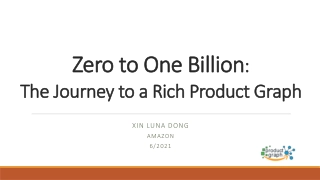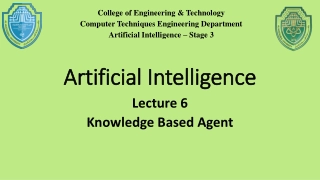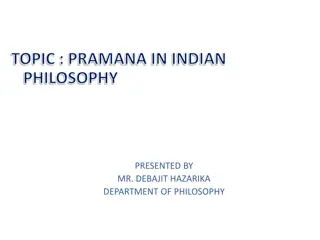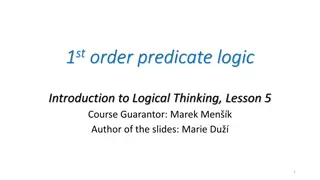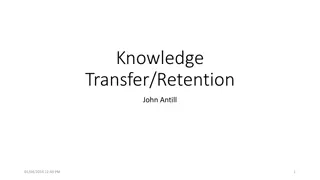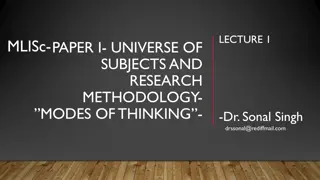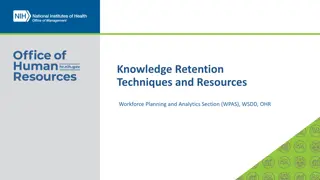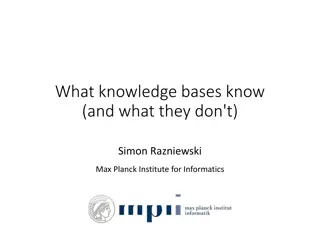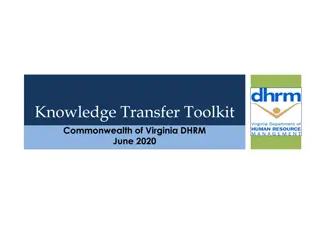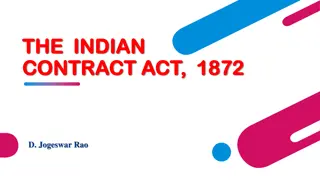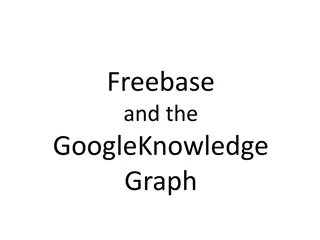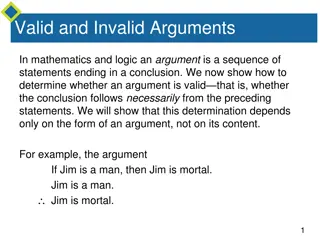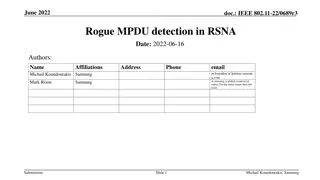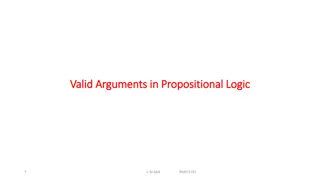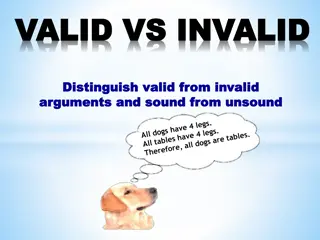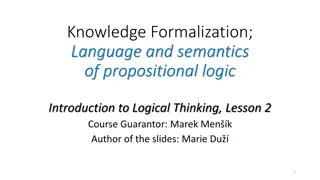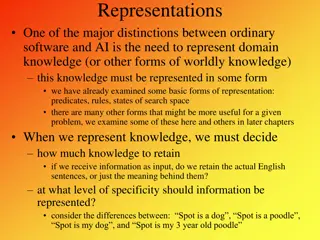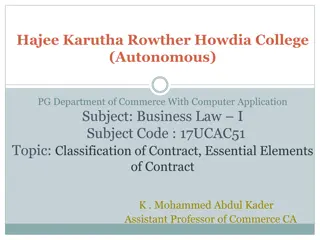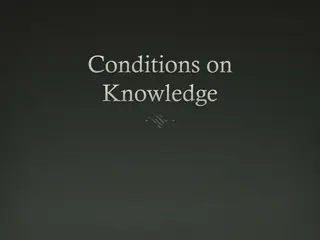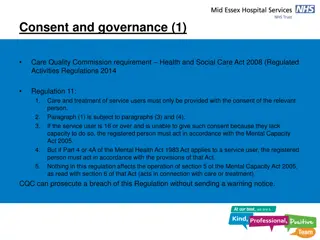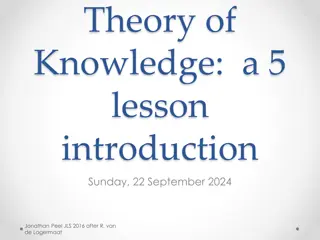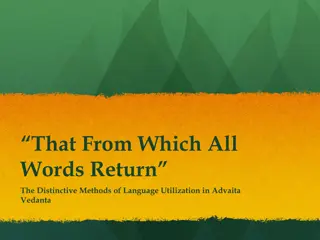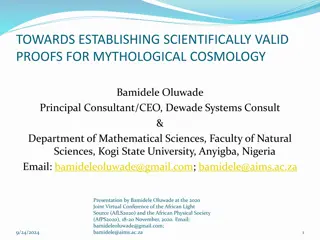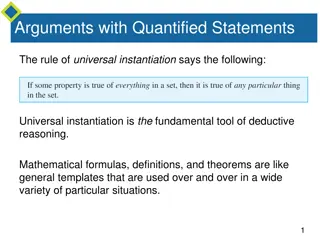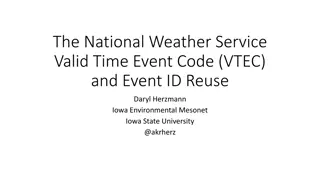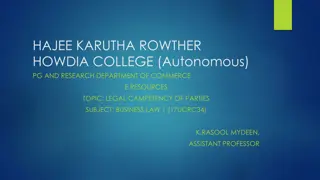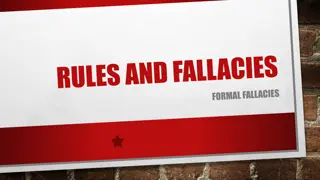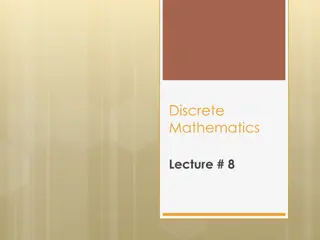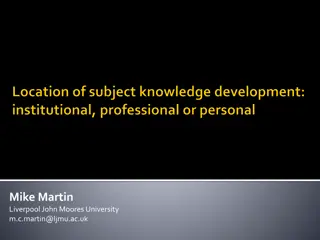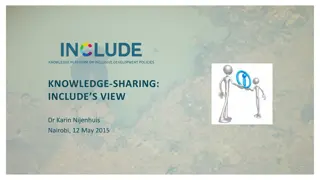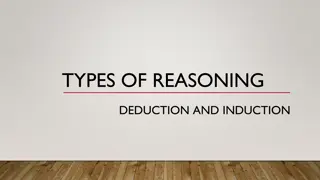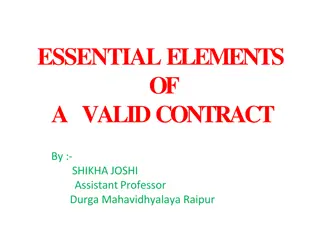Knowledge Capture
Knowledge capture is crucial for organizations to retain valuable expertise and prevent loss of critical knowledge due to employee turnover. Tacit and explicit knowledge play key roles, requiring strategic planning for retention, incentivizing knowledge-sharing culture, and implementing effective st
0 views • 6 slides
Exploring Product and Knowledge Graphs for Enhanced Information Retrieval
Dive into the world of product and knowledge graphs, uncovering the journey to a rich product graph, examples of knowledge graphs for songs, and the mission to provide comprehensive information on products and related knowledge. Discover use cases ranging from information provision to enhancing sear
3 views • 76 slides
Understanding Knowledge-Based Agents in Artificial Intelligence
Knowledge-Based Agents in AI utilize logic and knowledge representation to accept tasks, learn, and adapt to changing environments. Logic plays a crucial role in forming complex world representations and deriving actions based on inference. The central component is the Knowledge Base (KB), represent
3 views • 19 slides
Understanding Knowledge Management: Processes and Frameworks 2. In knowledge management, organizations create, share, and manage knowledge to enhance performance. It involves acquiring different types of knowledge through various means, such as perc
Knowledge Management, Organizational Objectives, Types of Knowledge, Tacit Knowledge, Explicit Knowledge
1 views • 17 slides
Understanding Pramana in Indian Philosophy by Mr. Debajit Hazarika
Philosophy delves into the quest for knowledge, with Epistemology exploring sources and validity. In Indian philosophy, Prama signifies true cognition, attainable through Pramana - the means to achieve valid knowledge. This discussion covers the six pramanas within various philosophical systems and
2 views • 11 slides
Introduction to 1st Order Predicate Logic in Logical Thinking
Explore the limitations of propositional logic and the enhanced expressive power of 1st order predicate logic (PL1). Understand how PL1 allows for analyzing the structure of atomic propositions and proving arguments that depend on these structures. Through examples and valid argument schemata, delve
0 views • 26 slides
Pedagogical Shift in Physical Science: Constructing Knowledge Through Learner-Centered Experiences
There is a significant pedagogical shift in physical science education from viewing science as a fixed body of knowledge to emphasizing the process of constructing knowledge. Learners are now placed at the center stage, engaging in inquiry-based learning, critical thinking, and collaborative interac
3 views • 21 slides
Understanding Generalization: Facts, Opinions, and Validity
Exploring the concept of generalization, this content distinguishes between facts, opinions, and valid generalizations. It emphasizes how generalizations are broad statements based on information and experiences, while facts can be proven true and opinions are belief-based. Key words and examples ar
1 views • 8 slides
Understanding Generalizations and Differentiating Between Valid and Faulty Ones
Generalizations are broad statements about groups of people or things sharing common traits. While some generalizations can be valid, supported by facts and logic, others may be faulty, lacking evidence and prone to inaccuracies. It's essential to use clue words like "all," "always," and "never" cau
1 views • 10 slides
Importance of Knowledge Retention in Organizations
Organizations face negative impacts on performance due to the loss of knowledge. Strategies such as exit interviews, mentorship, and knowledge sharing tools are vital for effective knowledge retention. Assessing knowledge retention maturity through various techniques is crucial, aligning with ISO st
0 views • 11 slides
Understanding Modes of Thinking and Knowledge Development
Man's acquisition of knowledge is intricately linked to his ability to think, reason, and perceive. Knowledge is a result of experiences gained through perception, intellect, and intuition. The history of humanity is a story of knowledge acquisition and development, with man at the forefront as the
1 views • 18 slides
Effective Knowledge Retention Strategies in Workforce Planning and Analytics
Retaining knowledge is crucial for organizations to enhance customer service, foster innovation, improve efficiency, and bridge skill gaps. This article explores the significance of knowledge retention, the types of knowledge essential for succession planning, and two effective strategies - the Know
0 views • 10 slides
Exploring Knowledge Base Construction and Commonsense Knowledge in Fiction
Delve into innovative research interests focusing on knowledge base construction using fictional texts as archetypes, taxonomies for constructing knowledge bases, and extraction of commonsense knowledge from diverse sources. Challenges such as sparsity and semantics are addressed through comprehensi
3 views • 48 slides
Knowledge Transfer Toolkit for Organizational Success
This toolkit, developed by the Commonwealth of Virginia DHRM in June 2020, covers the essentials of knowledge transfer, including its definition, impact, challenges, and management strategies. It emphasizes aligning knowledge transfer with strategic goals, overcoming barriers through leadership supp
2 views • 15 slides
Understanding the Indian Contract Act of 1872
The Indian Contract Act of 1872 is a significant legislation that governs contracts and agreements in India, excluding Jammu and Kashmir. It defines terms like contract, agreement, offer, and acceptance while outlining the essential elements required for a valid contract. The Act distinguishes betwe
0 views • 15 slides
Evolution of Freebase and the Google Knowledge Graph
Freebase was initially created in 2005 as an open shared database of knowledge, later acquired by Google and absorbed into the Google Knowledge Graph. Its approach included crowdsourcing updates and additions, focusing on data rather than text. The schema of Freebase included around 1500 types, 3500
1 views • 12 slides
Understanding Valid and Invalid Arguments in Mathematics and Logic
In mathematics and logic, determining the validity of an argument depends on its form rather than its content. An argument is considered valid if the conclusion necessarily follows from the premises. This determination involves analyzing the abstract form of the argument, constructing truth tables t
0 views • 32 slides
Rogue MPDU Detection in RSNA Issues and Solutions
Abstract CIDs highlighted issues related to valid MPDUs not being acknowledged due to malicious attacks in RSNA. Efforts were made to enhance security using Protected Block Ack, but vulnerabilities persist. Various solutions are being explored, and input from group members is sought to find the best
2 views • 12 slides
Understanding Valid Arguments in Propositional Logic
An argument in propositional logic consists of premises leading to a conclusion. Valid arguments are those where the truth of the premises implies the truth of the conclusion. To determine validity, you can construct a truth table to check if the conclusion always holds when all premises are true. T
0 views • 9 slides
Understanding Valid and Invalid Arguments in Logic
In logic, arguments consist of premises supporting a conclusion, with deductive arguments claiming logical necessity. Valid arguments have premises implying the conclusion, making them deductively valid. For example, if all actors are robots and Tom Cruise is an actor, then logically Tom Cruise must
0 views • 25 slides
Introduction to Formalization and Valid Reasoning in Logic
Understanding the need for formalizing natural language in logic to eliminate ambiguities and vagueness. Exploring valid forms of reasoning and how logical rules help in automating correct arguments. Introducing propositional and predicate logic systems with examples of valid arguments.
0 views • 23 slides
Understanding Knowledge Representation in Artificial Intelligence
In AI, representing domain knowledge is crucial and comes in various forms like predicates, rules, and search space states. Deciding the level of specificity and form of representation is key. Knowledge can be categorized into procedural, domain, and common sense knowledge, available in forms such a
2 views • 32 slides
Understanding Contracts: Classification and Essential Elements
A contract is an agreement between parties to perform certain obligations. This article explores the classification of contracts based on enforceability, formation, and performance. It discusses the essential elements of a valid contract, types of contracts such as valid, void, voidable, illegal, an
0 views • 33 slides
Exploring Epistemology: Understanding Knowledge and Truth
Epistemology delves into the nature of knowledge, understanding, wisdom, and justification, questioning the extent of human knowledge and the different kinds of knowledge. It explores skepticism and conditions on propositional knowledge, discussing whether knowledge implies truth and the debate betw
1 views • 54 slides
Navigating the World of Big Data, Knowledge, and Crowdsourcing
The world has evolved into a data-centric landscape where managing massive amounts of data requires the convergence of big data, big knowledge, and big crowd technologies. This transformation necessitates the utilization of domain knowledge, building knowledge bases, and integrating human input thro
1 views • 5 slides
Understanding Consent and Governance in Health and Social Care
The Health and Social Care Act 2008 outlines the importance of obtaining consent for the care and treatment of service users, incorporating regulations from the Mental Capacity Act 2005 and Mental Health Act 1983 where necessary. The Francis report emphasizes the need for informed consent or lawful
0 views • 33 slides
Exploring the Nature of Knowledge in Theory of Knowledge
Delve into the essence of knowledge with Jonathan Peel's introduction to Theory of Knowledge, pondering on how different disciplines perceive knowledge, the impact of empirical questioning, and timeless wisdom on ignorance and progress. Explore the concept of basic knowledge and its implications, in
0 views • 37 slides
Insights into Advaita Vedanta and Hinduism: Tradition, Knowledge, and Liberation
Explore the profound concepts of Advaita Vedanta and the rich diversity of Hinduism. Dive into the distinctive methods of language utilization, the tradition's reliance on Vedas and Upanishads, the criteria for valid knowledge, the essence of Brahman as the ultimate reality, and the challenges in kn
0 views • 15 slides
Towards Establishing Scientifically Valid Proofs for Mythological Cosmology by Bamidele Oluwade
This presentation by Bamidele Oluwade explores the research on mythological cosmology, aiming to provide scientifically valid proofs for metaphysical phenomena through mathematical models and standard methods of proof in mathematics, supported by scientific/thought experiments and results from vario
0 views • 45 slides
Understanding Modelling Knowledge and Knowledge Representation
Explore the significance of modelling knowledge through knowledge representation, making it explicit, independent, and reusable. Learn why knowledge representation is essential and how it facilitates exchange, query, inference, and visualization. Delve into examples of knowledge application in vario
0 views • 30 slides
Overview of Indian Contract Act 1872 and Essential Contract Law Principles
This detailed content provides insights into the Indian Contract Act 1872, essential principles of contract law including valid contracts, classification of contracts, essentials of a valid offer, and legal rules of acceptance. It covers topics such as enforceability, legal obligations, valid contra
0 views • 9 slides
Understanding Universal Instantiation in Deductive Reasoning
Universal instantiation is a crucial tool in deductive reasoning, allowing us to derive specific conclusions from general statements. By combining universal instantiation with modus ponens and modus tollens, we can construct valid arguments such as universal modus ponens and universal modus tollens.
0 views • 13 slides
Understanding the National Weather Service Valid Time Event Code (VTEC)
Explore the evolution of the National Weather Service Valid Time Event Code (VTEC) system introduced in 2005 by Daryl Herzmann at Iowa State University. Learn about the importance of VTEC in weather alerts and how it revolutionized the dissemination of critical weather information. Dive into example
0 views • 10 slides
Legal Competency of Parties in Business Law: Understanding Capacity to Contract
Capacity to contract is crucial in business law, ensuring parties are competent to enter valid agreements. Minors, persons of unsound mind, and those disqualified by law lack competency to contract. In India, minors under 18 years cannot enter valid contracts, and contracts by minors are void. Howev
0 views • 10 slides
Rules and Fallacies in Valid Syllogisms
Valid syllogisms must adhere to specific rules to avoid committing formal fallacies. These rules include distribution, quality, and quantity concepts. Breaking these rules can lead to fallacies such as undistributed middle, illicit major, and illicit minor. Examples are provided to illustrate these
0 views • 18 slides
Understanding Valid and Invalid Arguments in Discrete Mathematics
Concepts of valid and invalid arguments in discrete mathematics are explored through examples. Learn how to determine the validity of arguments based on premises and conclusions. Practice using truth tables to evaluate argument forms. Enhance your logical reasoning skills in Discrete Mathematics.
0 views • 22 slides
Understanding Subject Knowledge Development in Education
Exploring the complexities of subject knowledge development in education, this study delves into areas such as students' existing knowledge, competencies, and the role of institutions in shaping knowledge acquisition. The focus lies on personalizing knowledge to individual needs rather than a fixed
0 views • 22 slides
Knowledge Sharing and Inclusive Development Policies
Knowledge Platform on Inclusive Development Policies (INCLUDE) focuses on enhancing research utilization in policy-making to foster more inclusive development. It was established in 2012 with the aim of bridging the gap between research and policy processes in African countries. INCLUDE engages expe
0 views • 8 slides
TYPES OF REASONING DEDUCTION AND INDUCTION
Reasoning involves a connected sequence of thoughts leading to a conclusion. Deductive reasoning moves from general to specific, identifying assumptions and hidden premises. Categorical syllogisms demonstrate valid and sound argument structures, while real-life arguments may require uncovering assum
0 views • 21 slides
Understanding Essential Elements of a Valid Contract
A valid contract requires key elements such as offer and acceptance, intention to create legal relations, lawful consideration, and competency of the parties. An agreement becomes enforceable at law only when it possesses these essential elements. The article discusses these elements along with rele
0 views • 10 slides

